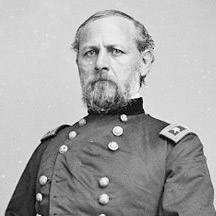On today's date in 1862, Union Maj. Gen. Don Carlos Buell was relieved of command of the Army of the Ohio in Kentucky and Tennessee for allowing Bragg's Confederate army to escape Kentucky. Lincoln authorized Maj. Gen. William S. Rosecrans to take over. Buell learned of his sacking on the 29th, from a local newspaper.
Rosecrans, the hero of Iuka and Corinth, will head the newly created Department of the Cumberland. He was immediately ordered to Louisville, via Cincinnati, to take charge of Buell’s former command. Almost universally, the men reacted with cheers and joy. Most assumed they would now go into winter quarters. Instead, as soon as he joined his new command, Rosecrans led his army back to Nashville to confront Bragg, who was taking a new a position in nearby Murfreesboro.
Born in Ohio, in 1819, Rosecrans was an 1842 graduate of the United States Military Academy, ranking fifth in a class of 56. Finding promotion slow in the peacetime army, and having no opportunity to gain advancement in the Mexican-American War, Rosecrans resigned his commission in 1854. Life as a businessman and inventor provided little more satisfaction and nearly killed him when a failed experiment severely burned his face. When the Civil War army offered Rosecrans an opportunity to return to the military profession, he seized it eagerly, rising to brigadier general by the summer of 1861. Success in Western Virginia soon brought him a transfer to the West, where he gained a semi-independent command under Ulysses S. Grant. In northern Mississippi Rosecrans fought strongly at the battles of Iuka and Corinth, although he earned Grant's displeasure at the same time. Promoted to major general in September 1862, he lobbied successfully to have the commission backdated to March. Now he commanded one of the nation's 3 largest field armies, centered in Nashville.
Rosecrans was known to be brilliant, articulate, firm in his convictions, and courageous. He was also a man of extraordinary energy, who drove both himself and his subordinates unmercifully. A devout Roman Catholic, he retained a personal chaplain on his staff. Unfortunately, his favorable virtues were offset by characteristics that were less beneficial. In temperament Rosecrans tended to be nervous and excitable. He was often impatient and critical of others, especially his superiors. Neither introspective nor an perceptive judge of others, Rosecrans had a remarkably simple outlook. Once convinced of the correctness of his views, he could be extremely smug. Generally affable with his staff, he often immersed himself in details better left to subordinates. This tendency, coupled with his love of philosophical and theological discussions, led him to remain active well past midnight, to the chagrin of his staff. He was often unable to sleep during campaigns and became increasingly nervous and irritable as operations accelerated around him.
But, despite his shortcomings, Rosecrans will soon amass important victories and fame for his successes at Murfreesboro and the Tullahoma Campaign.
Sources: Official Records, Vol 16, Part 1; The Civil War Almanac, John S. Bowman; National Park Service




